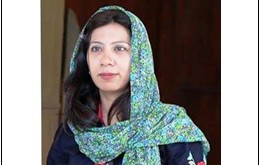LAHORE May 1, 2014: A delegation of senior German parliamentarians on Thursday visited a vocational training institute run by the Lahore Businessmen Association for Rehabilitation of the Disabled (LABARD) to see a special project aiming at equipping the disabled men and women with employable skills in Punjab.
Members of the delegation, which was headed by Professor Dr. Norbert Lammert, President of the German Bundestag (Parliament), were briefed about the overall interventions undertaken by LABARD, which works under the Lahore Chamber of Commerce and Industry (LCCI), with a specific focus on a special project called “Vocational Training for the Disabled in Punjab, Lahore.”
 This project is co-funded by the German Federal Ministry for Economic Cooperation and Development, the European Union and the Embassy of the Kingdom of the Netherlands through a Fund for Innovative Training, created under a five-year Technical and Vocational Education and Training (TVET) Reform Support Programme. The Deutsche Gesellschaft für Internationale Zusammenarbeit (GIZ) GmbH is implementing this programme.
This project is co-funded by the German Federal Ministry for Economic Cooperation and Development, the European Union and the Embassy of the Kingdom of the Netherlands through a Fund for Innovative Training, created under a five-year Technical and Vocational Education and Training (TVET) Reform Support Programme. The Deutsche Gesellschaft für Internationale Zusammenarbeit (GIZ) GmbH is implementing this programme.
The president of LABARD, Muhammad Parvaiz Malik, who is also a member of the National Assembly, welcomed the visiting German parliamentarians and briefed them about the different aspects of the project. He appreciated the role of Germany in promoting vocational training and assisting in reforming the overall TVET sector of Pakistan, specially supporting the short-term training programmes for the marginalized segments of the society.
 In Pakistan, over 5 % of the population are affected by disabilities. Most of them, particularly the poor, are socially and economically disadvantaged and struck by discrimination. In addition, young people with disabilities face considerable challenges to access education and vocational training. Parents are often helpless in dealing with the situation. To address this serious concern, LABARD provides vocational skills development programs and information on employment opportunities for people with disabilities.
In Pakistan, over 5 % of the population are affected by disabilities. Most of them, particularly the poor, are socially and economically disadvantaged and struck by discrimination. In addition, young people with disabilities face considerable challenges to access education and vocational training. Parents are often helpless in dealing with the situation. To address this serious concern, LABARD provides vocational skills development programs and information on employment opportunities for people with disabilities.
The project was launched in Nov 2012 and by the end in May 2015 will have a total of 1485 men and women with disabilities trained in different market-oriented vocational training courses ranging from three to six months in duration. Currently, a total of 535 persons have been trained, while 951 are going through the training process. After successful training most of the pass outs from this project have gotten jobs in different enterprises or become self-employed.
 Appreciating the work of LABARD, Dr.Lammert underlined the importance of equipping the marginalized segments with employable skills, saying with relevant skills people with disabilities can earn decent livelihoods, and they can be economically empowered. He said that such types of projects are good examples to be replicated at a wider scale to offer access to the vocational training to the target group of population.
Appreciating the work of LABARD, Dr.Lammert underlined the importance of equipping the marginalized segments with employable skills, saying with relevant skills people with disabilities can earn decent livelihoods, and they can be economically empowered. He said that such types of projects are good examples to be replicated at a wider scale to offer access to the vocational training to the target group of population.
Earlier, Dr. Julie Reviere, Programme Director GIZ Education, also briefed the delegation about the TVET Reform Support Programme and its main achievements in reforming the TVET system of Pakistan.
 Pakistan TVET REFORM Support Programme Technical and Vocational Education and Training (TVET) Reform support Programme
Pakistan TVET REFORM Support Programme Technical and Vocational Education and Training (TVET) Reform support Programme






